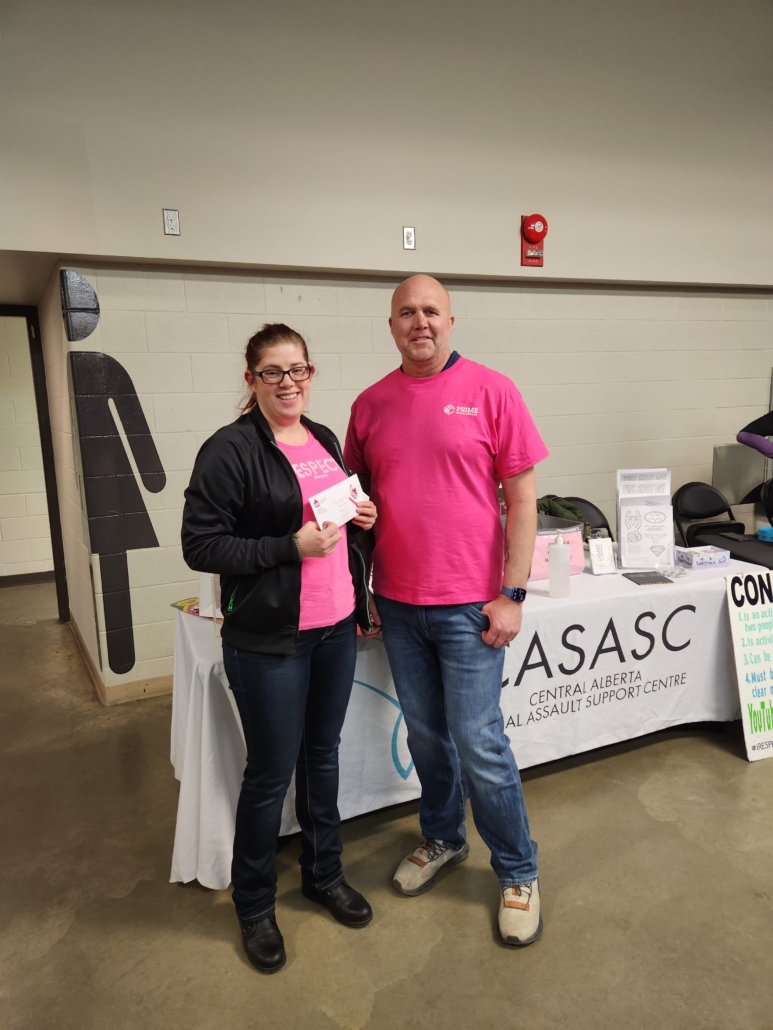By Carlia Schwab
Why is bullying a topic we are still talking about?
On February 22 many communities across Alberta will celebrate Pink Shirt Day, a day to create awareness and show your support for anti-bullying.
Here at the Central Alberta Sexual Assault Support Centre (CASASC) we like to talk about bullying prevention all month long. We seek to help change the narrative surrounding bullying – where bullying is about what you do (the behaviour), not about who you are, a bully. Bullying behaviour is intentional, meaning it often involves one person repeatedly misusing their power/privilege to negatively impact the actions and feelings of another person or influence peers to join in.
Changing the narrative involves understanding bullying behaviour and talking about respectful relationships and positive use of power. This is something you can do at any age.
Children
Bullying behaviour for children can be seen in a breakdown of respectful interactions with siblings and peers. Examples include pushing and shoving, throwing toys at others, not allowing others to join in a game or activity, hurting others due to strong emotional reactions (ex. hurting others who won’t share), and prioritizing their wants no matter the impact on others (ex. laughing at others for attention or pushing someone out of line because they want to be first).
Children are at an ideal age for adults to reinforce healthy relationship skills. We can teach children about the impacts of our words and actions and how to understand emotions. Use teachable moments to empower children to make more respectful decisions when interacting with others. Adults can role model healthy behaviours, show how to use respectful language to communicate with others, and reinforce strategies for calming down and re-directing our emotions so we don’t make choices to harm others.
Youth
Bullying behaviour for youth can be seen in a school or team context, by peers, friends or teammates. It is a misuse of power directed at others for personal or social gain and can be verbal or physical, involve our peers and emotions (social), and can occur using technology (cyber). Exclusion, fights, degrading comments, gossiping and rumor spreading, are all common examples of bullying behaviour that youth experience.
We can have an impact on youth bullying behaviour by reinforcing peer-to-peer relationship skills. Empowering youth to develop and use positive life skills like assertive communication, conflict resolution, empathy, understanding diversity, and challenging harmful labels and stereotypes.
We can keep digital literacy and bystander intervention top of mind when supporting youth. Encourage youth to take their digital realities seriously, understand both the positive and negative aspects of living within a technology focused world and be able to problem solve helpful solutions when technology is used to harm others. Encourage respectful bystander interventions, practice helping others, ensure youth understand the impacts of harmful behaviours and brainstorm intervention solutions and responses.
Adults
Bullying behaviour for adults often occurs within family groups or in the workplace. It can consist of gossiping and rumor spreading, exclusion and targeted cruel and hurtful comments.
We can challenge adult bullying behaviour by practicing conflict resolution or assertive statements that can be used to interrupt the harmful behaviours we encounter or are a part of. We can be aware of workplace policies and processes, connect in with Human Resources about reporting and resolution steps. From a prevention lens, we can build rapport with others, get to know the similarities and difference we have with others, intervene when we see harmful behaviours, find ways to treat everyone with respect and don’t participate in gossip.
We can see bullying is a relationship problem that requires relationship solutions at all stages. When we don’t encourage relationship solutions as a prevention tool or a response measure, our ability to build resiliency and respond to the impacts of bullying behaviour are less developed.
The impacts of bullying behaviour are wide and don’t just hurt in the moment, it can hurt for a very long time. Impacts can be felt by everyone involved – the person targeted, the person doing the bullying behaviour, the people who witnesses it, family, friends, our school, workplace and community.
Short-term impacts of bullying behaviour can include:
Feeling anxious, feeling depressed, low self-esteem, trouble concentrating, trouble sleeping, poor body image, headaches, body pains, missing school/work, isolation, loneliness, few social relationships, withdrawal from family/friends, lying.
Long-term impacts of bullying behaviour can include:
Anxiety, depression, low self-esteem, mental health issues/poor mental health, poor physical health, increased used of drugs and/or alcohol, harmful coping mechanisms, self-harm, lack of social relationships, dropping out of school, lower level of employment.
Having empathy and understanding how others feel and how they are impacted by bullying behaviour can motivate us to step in and help others. We all have the power to help or hurt others.
Bullying behaviour doesn’t go away and hasn’t become less prevalent just because we have exhausted the conversation. Bullying behaviour requires real and healthy relationship solutions and until we can make relationship solutions and education consistent, we will always need a platform to talk about the issue. Be part of a relationship solution, not a contributor to a bullying reality.
If you or someone you know would like support in working through a bullying situation and its’ impacts, please reach out to trusted adults, human resources, school counsellors, online resources, or help lines.
Don’t excuse the behaviour as normal or “something everyone goes though.” Instead validate the feelings and impacts caused by harmful bullying experiences and seek to change the narrative. It doesn’t just have to be physically harmful, violent or a mental health issue to warrant support.
We are all worthy and deserving of having relationships, living, and interacting in spaces free from bullying behaviour.
Carlia Schwab is the Education and Community Awareness Manager at the Central Alberta Sexual Assault Support Centre.


